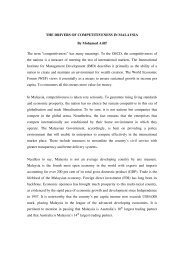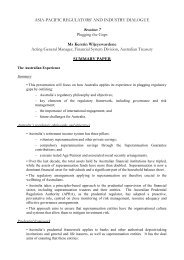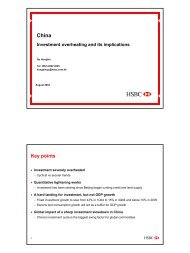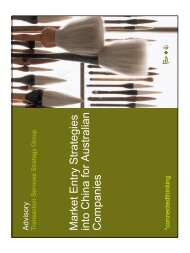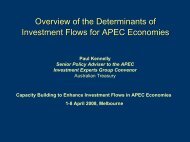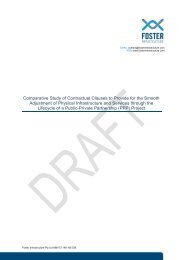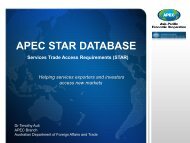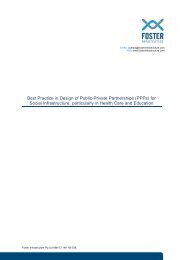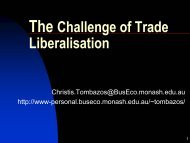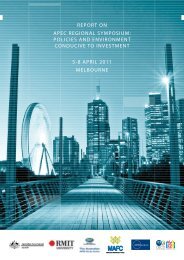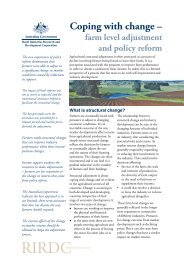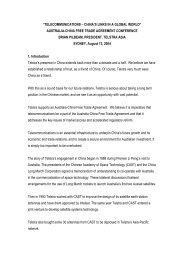2011 - Australian APEC Study Centre
2011 - Australian APEC Study Centre
2011 - Australian APEC Study Centre
You also want an ePaper? Increase the reach of your titles
YUMPU automatically turns print PDFs into web optimized ePapers that Google loves.
THE AUSTRALIAN <strong>APEC</strong> STUDY CENTRE<br />
CENTRE ACTIVITY REPORT<br />
July 2010 – June <strong>2011</strong><br />
Prepared for the Advisory Board Meeting 1 August <strong>2011</strong>
TABLE OF CONTENTS<br />
1.0 SUMMARY................................................................................................................................ 1<br />
2.0 INTRODUCTION ...................................................................................................................... 1<br />
3.0 CENTRE’S FINANCIAL POSITION ......................................................................................... 3<br />
4.0 FUTURE ACTIVITIES AND STRATEGIC DIRECTIONS ......................................................... 3<br />
5.0 SUMMARY OF ACTIVITIES IN THE PERIOD JULY 2010 TO JUNE <strong>2011</strong> ............................. 4<br />
6.0 CAPACITY BUIILDING PROGRAMS ....................................................................................... 5<br />
7.0 CONFERENCES,SYMPOSIA, LECTURES AND RECEPTIONS............................................. 6<br />
8.0 INTERNATIONAL ACTIVITIES................................................................................................. 7<br />
9.0 INTERNATIONAL MEETINGS AND SPEECHES .................................................................... 7<br />
10.0 OTHER ACTIVITIES ............................................................................................................... 8<br />
11.0 OTHER MEETINGS AND SPEECHES .................................................................................. 8<br />
12.0 FUTURE ACTIVITIES ............................................................................................................. 9<br />
13.0 PROPOSALS AND BIDS ...................................................................................................... 13<br />
14.0 RESEARCH, PUBLICATIONS AND REPORTS................................................................... 14<br />
15.0 MEDIA/PUBLIC EXPOSURE................................................................................................ 14<br />
16.0 CENTRE STAFF ................................................................................................................... 16<br />
17.0 ATTACHMENTS ................................................................................................................... 17<br />
Attachment 1 – Mission Statement and Key Performance Indicators<br />
Attachment 2 – <strong>Centre</strong> Advisory Board and Financial Services Advisory Board
1.0 SUMMARY<br />
The goals and objectives of the <strong>Centre</strong> and a statement of our core activities are set out in<br />
Attachment 1.<br />
The <strong>Centre</strong> has deepened its relationship with RMIT and specifically with the College of<br />
Business. This relationship has afforded the College of Business the ability to build stronger<br />
relationships with the state and federal government, links with the Global Business and<br />
Engagement Unit, research credits from our cutting-edge training programs, improve the<br />
industry profile of RMIT facilities such as the refurbished Emily Macpherson building and the<br />
new RMIT campus in Hanoi, and increase marketing and positioning of RMIT throughout the<br />
Asia Pacific.<br />
The <strong>Centre</strong>’s finances remain sound but there is increased competition for funding. The last<br />
tranche of funding under the Melbourne <strong>APEC</strong> Finance <strong>Centre</strong> has been received and the<br />
program, which commenced in 2007, is now being reviewed. We are confident of a favourable<br />
review.<br />
We have widened the range of activities we bid for under AusAID PSLP and other programs<br />
but maintained relevance to our core capacities. We continue to maintain strong links with<br />
<strong>APEC</strong> and in particular ABAC (<strong>APEC</strong> Business Advisory Council) and with international<br />
agencies.<br />
Commonwealth Departments continue to support the work of the <strong>Centre</strong>, in particular DFAT<br />
and Treasury and key regulatory agencies such as the APRA, ASIC and the RBA.<br />
Our linkages with industry and with academia broadly in Australia and in the region are<br />
deepening.<br />
We are seeking to establish a partnership funding agreement with AusAID; such agreements<br />
are recommended under AusAID’s recent Independent Review of Aid Effectiveness.<br />
The centre has been extremely busy with capacity building programs and other activities and<br />
has a full calendar until 1 st quarter 2012.<br />
2.0 INTRODUCTION<br />
The relationship with RMIT is a vibrant one and strongly collaborative. The <strong>Centre</strong><br />
values the deep cooperation with the College, through Professor Aaron Smith and with the Pro<br />
Vice Chancellor Ian Palmer. Where practicable, the <strong>Centre</strong> utilises RMIT facilities for the<br />
delivery of its programs, and in particular the refurbished Emily McPherson building.<br />
The Vice Chancellor gave the opening address to a major regional symposium, “Enhancing<br />
Financial Policy and Regulatory Cooperation – Responses to the Global Financial Crisis”,<br />
convened in March, and the Pro Vice Chancellor, College of Business opened a symposium in<br />
April, “Policies and Environment Conducive to Investment”.<br />
We seek to involve RMIT academics in training programs and most recently we commissioned<br />
the services of a coordinator in designing and implementing a training component of an<br />
<strong>Australian</strong> Leadership Fellowship Program on public private partnerships in infrastructure. The<br />
program involved an academic from the Graduate School of Business and Law. The RMIT<br />
School of Property Construction and Project Management organised a seminar as part of the<br />
program on “Directions and Issues for PPP Research”.<br />
We arranged the delivery of a program at RMIT University campus in Hanoi in October 2010<br />
and which was opened by the President of RMIT Vietnam. We plan to convene a workshop in<br />
the 1 st quarter 2012 at the RMIT Campus in Ho Chi Minh.<br />
The <strong>Australian</strong> <strong>APEC</strong> <strong>Study</strong> <strong>Centre</strong> at RMIT University www.apec.org.au Page 1
We are discussing with the College of Business the possible relocation of the <strong>Centre</strong> to the<br />
Swanston Academic Building (SAB), due for completion in early 2013.<br />
The <strong>Centre</strong> continues to gain academic research credits for the College of Business, based on<br />
components of our training programs and activities that can qualify as research related. While<br />
this is time consuming it makes a substantial contribution to the relationship with the<br />
University.<br />
We are delighted to advise that the Executive Manager of the <strong>Centre</strong> has been selected to<br />
participate in LeadRMIT, a program to develop leadership capabilities in the University.<br />
Linkages are strong and growing. Through our strong links with ABAC and its Advisory<br />
Group on financial system capacity building (the Director of the <strong>Centre</strong> is a member of that<br />
group), we are able to demonstrate support for our funding applications to AusAID, and to the<br />
<strong>APEC</strong> Secretariat, that our activities are strongly supportive of <strong>APEC</strong>’s agenda. We are<br />
continuing to develop relationships with the World Bank Singapore Office in creating modules<br />
to promote public private partnerships in infrastructure financing, and with the ADBI on<br />
financial regulation and supervision and with the OECD on investment.<br />
The DFAT website on impediments to financial trade services in the <strong>APEC</strong> region has been<br />
expanded by 6 more economies and it has been turned into an <strong>APEC</strong> Secretariat funded<br />
project. It is a deliverable for this year’s <strong>APEC</strong> Leader’s meeting in Honolulu in November.<br />
The <strong>Centre</strong> is responsible for managing this database in cooperation with ITS Global. A<br />
recommendation is imminent that the database be expanded to cover all <strong>APEC</strong> member<br />
economies.<br />
We have completed work on the Treasury Catalogue of Policy Choices and provided our<br />
assessment on the Catalogue. Our view is that this exercise has had very limited impact and<br />
has made at most a modest contribution to <strong>APEC</strong>’s work on supporting policy initiatives to<br />
strengthen financial and regulatory supervisory policies in the region. This result is as a<br />
consequence of the constraints placed on access to the data base and the policy material that<br />
was originally envisaged be included in the Catalogue. We have advised Treasury that these<br />
matters need to be addressed in the (unlikely) event that <strong>APEC</strong> seeks to develop the concept<br />
further.<br />
Notwithstanding the completion of the funding by the Victorian Government, we continue to<br />
build relationships with the government agencies, in particular the Department of Business<br />
Development and Innovation and Partnership Victoria, an office under the Department of<br />
Treasury and Finance. We are supporting a review of the outcomes of the MAFC program<br />
being undertaken by the NOUS Group on behalf of the government. This review will examine<br />
the program objectives and the review team will consult with major stakeholders. It is expected<br />
to be completed in September <strong>2011</strong>.<br />
Partnerships. We will seek to develop a partnership funding agreement with AusAID. Such<br />
an agreement would provide certainty of funding over a medium term period and reduce the<br />
administrative burden on both AusAID and its partners<br />
We are entering into a partnership with the Asian Development Bank Institute (ADBI) to<br />
collaborate on capacity building training programs and research. We have recently undertaken<br />
a program on financial inclusion in the Philippines with the Association of Development<br />
Finance Institutions in Asia and the Pacific (ADFIAP). We are discussing a partnership to<br />
promote joint capacity building activities in financial regulation and supervision and financial<br />
inclusion with the Association.<br />
The <strong>Australian</strong> <strong>APEC</strong> <strong>Study</strong> <strong>Centre</strong> at RMIT University www.apec.org.au Page 2
3.0 CENTRE’S FINANCIAL POSITION<br />
The current financial position of the <strong>Centre</strong> is sound and the <strong>Centre</strong> is committed to generating<br />
an operating surplus. Victorian Government funding for the MAFC program has concluded,<br />
reducing guaranteed income.<br />
The surplus provides an opportunity to recruit an additional staff member. Despite increased<br />
competition for funding the centre continues to win AusAID funding. The <strong>Centre</strong> has been<br />
successful in widening its sources of funding to include work commissioned by DFAT and by<br />
the <strong>APEC</strong> Secretariat. We are confident of receiving funding from the World Bank. A<br />
partnership agreement with AusAID would be a significant contribution to the medium term<br />
financial strength of the <strong>Centre</strong>.<br />
4.0 FUTURE ACTIVITIES AND STRATEGIC DIRECTIONS<br />
We continue work to develop a proposal in response to a request by the World Bank Urban<br />
Hub in Singapore to provide video conferencing training modules for Vietnam officials and<br />
potentially other ASEAN members. The modules relate to Public Private Partnerships in<br />
Infrastructure – a major but complex priority on <strong>APEC</strong>’s agenda. We are also assisting with a<br />
World Bank organised study tour of PPP officials from Vietnam, in Melbourne from 10-12<br />
August.<br />
The <strong>Centre</strong>’s work in this sphere of activity is in part driven by the quality and involvement of<br />
the Victorian public and private sectors in PPPs and the emphasis placed on promoting PPPs<br />
as part of the MAFC mandate.<br />
In addition, the <strong>Centre</strong> is supporting the development of an Asia Pacific Infrastructure<br />
Partnership of high-level business representatives and the multilateral development banks, in<br />
forming a panel to advise <strong>APEC</strong> Ministers and senior officials on strategic aspects of PPPs<br />
and ways in which to attract private capital. The formation of APIP is being promoted by the<br />
<strong>APEC</strong> Business Advisory Council and its Advisory Group. These activities are regarded as<br />
priorities by <strong>APEC</strong> Leaders and Finance Ministers in the development of the region. The<br />
Chairman of the <strong>Centre</strong>’s Advisory Board, Mr. Mark Johnson is leading this work and the<br />
<strong>Centre</strong> Director is supporting it through his participation the ABAC Advisory Group.<br />
The centre has been approached about the provision of training services to the National<br />
Provident Fund of Fiji- to strengthen capacities across various functions of the Fund, but<br />
progress on this is impeded by the current political standoff between Australia and Fiji.<br />
The <strong>Centre</strong> is in discussions with representatives from IMF Tokyo office, responsible for IMF<br />
operations in the Pacific, to consider, inter alia, the possibility of providing training to small<br />
Pacific island states.<br />
The <strong>Centre</strong> will continue to bid for AusAID PSLP funding and will also look at new and<br />
alternative funding sources for future programs. The <strong>Centre</strong> is also looking to consolidate its<br />
position as the leading <strong>APEC</strong> <strong>Study</strong> <strong>Centre</strong> in the region and promote RMIT’s interests in<br />
Australia and the region<br />
Specifically, the <strong>Centre</strong> proposes to undertake the following activities:<br />
§<br />
Review on a continuous basis with Commonwealth Departments major opportunities<br />
that are anticipated in <strong>APEC</strong>, ASEAN, the East Asian Community and in the Pacific<br />
more broadly; determine priorities for funding under PSLP and related funding sources<br />
that make competitive and attractive bids;<br />
• Build on recent discussions with AusAID, DFAT and Treasury to support <strong>Australian</strong><br />
initiatives fora new <strong>APEC</strong> strategy for structural reform in the region; to continue to<br />
The <strong>Australian</strong> <strong>APEC</strong> <strong>Study</strong> <strong>Centre</strong> at RMIT University www.apec.org.au Page 3
develop core work in trade and investment liberalisation, sustainable energy<br />
developments, trade in services, connectivity and logistics, financial system<br />
strengthening and financial inclusion<br />
In strategic terms the <strong>Centre</strong> proposes to focus on:<br />
• Building institutional policy and regulatory capacities of economies in <strong>APEC</strong>, ASEAN,<br />
Pacific, South Asia and the East Asia Summit;<br />
• Promoting the objectives of RMIT University and positioning itself for a deeper integrated<br />
presence with RMIT University to 2015;<br />
• Promote and support the Victorian government in building Melbourne as a centre of<br />
excellence for regional financial training and as regional financial sector<br />
• Enhancing the <strong>Centre</strong>’s financial viability<br />
5.0 SUMMARY OF ACTIVITIES IN THE PERIOD JULY 2010 TO JUNE <strong>2011</strong><br />
Capacity Building and Symposium Initiatives<br />
Following successful bids for funding from the AusAID PSLP program; the <strong>Centre</strong> convened<br />
the following major programs in the period of this report:<br />
• A capacity building training program ‘Improving supply chain connectivity across <strong>APEC</strong><br />
economies through open and competitive services’ (22 – 24 September 2010 in Manila;<br />
27 – 29 September in Hanoi)<br />
• A major regional symposium “Enhancing financial policy and regulatory capacities to<br />
implement reforms in response to the global financial crisis” (8-9 March <strong>2011</strong>)<br />
• A major regional symposium – “ Enhancing investment flows by reducing risk in private<br />
investment in <strong>APEC</strong> economies” (5-8 April <strong>2011</strong>)<br />
• A regional symposium –“Financial regulations supporting MSME (micro, small and<br />
medium enterprise) lending to promote financial inclusion” (27-28 June <strong>2011</strong> in Manila)<br />
We designed, and organized the following<br />
• <strong>Australian</strong> Leadership Awards (ALA) Fellowship Program<br />
‘Promoting Public Private Partnerships in Infrastructure Development’ - (this program<br />
was executed in July <strong>2011</strong>)<br />
• Training Program for senior China Bohai Bank officials - in conjunction with RMIT<br />
Executive Education - (this program to be delivered in the period 19-28 July <strong>2011</strong>)<br />
The <strong>Centre</strong> also participated in or convened other activities, including<br />
• In association with ITS Global and ASTA, the development and operation of a website<br />
to assist businesses across the region in understanding the barriers to trade in services<br />
in <strong>APEC</strong> economies. This website is currently being expanded to include 6 more <strong>APEC</strong><br />
economies.<br />
• The Islamic Finance Road show, Melbourne, May <strong>2011</strong>-07-31<br />
The <strong>Australian</strong> <strong>APEC</strong> <strong>Study</strong> <strong>Centre</strong> at RMIT University www.apec.org.au Page 4
6.0 CAPACITY BUILDING PROGRAMS<br />
6.1<br />
Program: Improving supply chain connectivity across <strong>APEC</strong> economies through open<br />
and competitive services’<br />
Funding Source: AusAID PSLP<br />
Dates: September 2010<br />
Location: Manila, Philippines and Hanoi, Vietnam<br />
The program aimed to improve trade logistics and supply chain connectivity to ensure the<br />
efficient of goods across borders. The programs engaged an international faculty from the<br />
Asian Development Bank, University of Asia and the Pacific, the Australia and New Zealand<br />
Chamber of Commerce, the National University of Singapore, the Asian Institute of<br />
Management, the University of Philippines and the University of Indonesia.<br />
The program involved 55 participants from the Philippines, Vietnam, Indonesia, Thailand and<br />
China from Ministries of Trade, Customs, Industry and Commerce. Ms Kristen Bondietti, senior<br />
consultant at ITS Global, was the Academic Coordinator. The programs were rated very highly<br />
by participants and commended by program presenters. Networking functions were attended<br />
by high level department supervisors and key contacts in the region including the Deputy<br />
Commissioner of the Bureau of Customs of the Philippines, the Director of Customs of<br />
Vietnam and CEOs and presidents of multiple companies in the Philippines and Vietnam. The<br />
<strong>Australian</strong> Ambassador to Vietnam and President of RMIT Vietnam spoke at the Hanoi<br />
networking function. (www.rmit.edu.au/browse;ID=ujz52fcfq194z)<br />
6.2<br />
Program: ALA Fellowships Program- Promoting Public Private Partnerships in<br />
Infrastructure Development<br />
Funding Source: AusAID ALA Fellowships Program and MAFC<br />
Dates: 2-22 July <strong>2011</strong><br />
Location: Melbourne, Australia<br />
The objective of this Fellowships Program was to address concerns in governments and public<br />
agencies about entering into relationships with the private sector in the component parts of the<br />
PPP process; to build confidence in the process and contribute to enhance investment flows in<br />
the region by exposing regional officials to best practices and deepening of their understanding<br />
of private sector interests in the PPP processes.<br />
The program involved a 5-day Leadership Training Course, 5-day Professional Placements,<br />
Site Visits and High-Level Roundtable Discussion. The roundtable involved ALA participants<br />
with <strong>Australian</strong> public and private sector experts and international specialists in PPP policy<br />
frameworks, financing, project evaluation, risk sharing and building a PPP pipeline of quality<br />
projects together with a review of activities undertaken during the placements.<br />
The program involved participants from China, Indonesia, Thailand, Peru, Brazil, Mexico, India<br />
and Pakistan. The Academic Coordinator was Paul O’Connor from the RMIT School of<br />
Property Construction, and Project Management. (www.apec.org.au/event2.asp?event=74)<br />
6.3<br />
Program for senior China Bohai Bank officials in conjunction with RMIT Executive<br />
Education<br />
Dates: 19-28 July <strong>2011</strong><br />
Location: Melbourne, Australia<br />
The <strong>Australian</strong> <strong>APEC</strong> <strong>Study</strong> <strong>Centre</strong> at RMIT University www.apec.org.au Page 5
The objective was to build relationships, to enhance understanding of the officials of Australia’s<br />
political and governance structures and of Australia’s financial system and the challenges<br />
arising in the post global financial crisis environment.<br />
7.0 CONFERENCES, SYMPOSIA, LECTURES AND RECEPTIONS<br />
7.1<br />
Symposium ‘Enhancing financial policy and regulatory capacities to implement reforms<br />
in response to the global financial crisis’<br />
Funding Source: AusAID PSLP and Melbourne <strong>APEC</strong> Finance <strong>Centre</strong><br />
Dates: 8-9 March <strong>2011</strong><br />
Location: Melbourne, Australia<br />
The objective was to build capacities in <strong>APEC</strong>’s developing financial system policy and<br />
regulatory agencies to consider the relevance, impact, and implementation, on the region’s<br />
financial systems of reforms proposed by international standard setting bodies in response to<br />
the global financial crisis. The goal to help <strong>APEC</strong> economies understand the complex nature<br />
of proposed reforms and their impact, and to implement best standards and practices as<br />
appropriate to regional economies, and to reduce future risk to financial systems and to<br />
economic stability arising from shocks to financial systems, and to build on the lessons learned<br />
from the global financial crisis. (www.apec.org.au/event2.asp?event=71)<br />
7.2<br />
Symposium: ‘Enhancing investment flows by reducing risk in private investment in<br />
<strong>APEC</strong> economies’ and ADBI/OECD/<strong>APEC</strong> Symposium and Roundtable on Investment<br />
for Balanced and Sustainable Growth<br />
Funding Sources: AusAID PSLP, Melbourne <strong>APEC</strong> Finance <strong>Centre</strong> and ADBI<br />
Dates: 5-8 April <strong>2011</strong><br />
Location: Melbourne, Australia<br />
The objective of the symposium was to build policy and implementation capacities to minimise<br />
investor risk in an uncertain global economic climate and to encourage and facilitate<br />
investment flows in the Asia-Pacific region. It drew on key lessons emanating from <strong>APEC</strong>'s<br />
investment framework, OECD's Policy Framework for Investment and work of the World Bank,<br />
UNCTAD, UNESCAP and the ADBI.<br />
The Roundtable considered how investment policies could contribute to the recovery from the<br />
global financial crisis and improve the development prospects across the Asia-Pacific. It also<br />
considered how the G20 Seoul Development Consensus for Shared Growth could promote<br />
private sector involvement and innovation. Special emphasis was placed on the mining and<br />
mineral sectors, in which investment flows are rapidly recovering to pre-crisis levels and<br />
developing Asia is a major destination. Papers and presentations can be found on the ADBI<br />
website<br />
(www.adbi.org/event/4491.adbi.oecd.apec.symposium.roundtable/events.resources.php?TypeI<br />
D=21)<br />
Participants included Investment and economic planning policy makers from the following<br />
Asia-Pacific economies: Bangladesh; Brunei-Darussalam; Cambodia; People's Republic of<br />
China; Fiji; Hong Kong, China; India; Lao PDR; Republic of Korea; Malaysia; Mongolia;<br />
Myanmar; Papua New Guinea; Philippines; Singapore; Solomon Islands; Sri Lanka; Thailand;<br />
Timor-Leste; and Vietnam. A selected number of business and civil society representatives<br />
were also invited.<br />
The <strong>Australian</strong> <strong>APEC</strong> <strong>Study</strong> <strong>Centre</strong> at RMIT University www.apec.org.au Page 6
8.0 INTERNATIONAL ACTIVITIES<br />
8.1<br />
Regional Symposium-Best Practice Regulatory Principles Supporting MSME Access to<br />
Finance<br />
Funding Sources: AusAID PSLP and ADFIAP<br />
Dates: 27-28 June <strong>2011</strong><br />
Location: Manila, Philippines<br />
This symposium sought to address this challenge by promoting a regulatory environment in the<br />
<strong>APEC</strong> region’s economies conducive to supporting increased lending by development banks,<br />
the commercial banking system and through capital markets. It was organised in partnership<br />
with the Association of Development Financing Institutions In Asia and the Pacific (ADFIAP).<br />
Deputy Governor Nestor A. Espenilla of Central Bank of the Philippines opened the<br />
symposium.<br />
The symposium was the first part of a two-part activity funded by AusAID under its Public<br />
Sector Linkages Program. The output are be proposals that will be submitted for consideration<br />
by <strong>APEC</strong> Finance Ministers and other fora as an action plan to further best practice regulatory<br />
approaches. The proposals will also be used as the basis for a subsequent 5-day capacity<br />
building training program for regional policy makers and regulators to be held in Melbourne,<br />
Australia in early 2012.<br />
Presentations materials can be found on the ADFIAP website at<br />
http://www.adfiap.org/news/adfiap-australian-apec-centre-hold-forum-on-msme-access-tofinance/<br />
9.0 INTERNATIONAL MEETING AND SPEECHES<br />
The Director of the <strong>Centre</strong> was involved in the following activities:<br />
- Participant in the ‘2010 <strong>APEC</strong> <strong>Study</strong> <strong>Centre</strong>s Consortium (ASCC) Conference’ in<br />
Tokyo, Japan. The title of the conference was ‘Achieving the Bogor Goals and Beyond’.<br />
He made two presentations. The first on ‘TFAP II – Assessment of 10% Reduction of<br />
Transaction Cost’, and the second on ‘Establish a new <strong>APEC</strong> Agenda; Achieving the<br />
Bogor Goals and Beyond'.<br />
- A meeting of the <strong>APEC</strong> Group on Services and Investment Experts’ Group, Sendai,<br />
Japan (Sept 2010) where he made a presentation on the trade in services data base<br />
- Meetings of the ABAC Advisory Group on <strong>APEC</strong> financial system capacity building:<br />
(Bangkok, August 2010; Yokohama, November 2010; Guangzhou, February <strong>2011</strong>;<br />
Seoul, April <strong>2011</strong><br />
- World Savings Bank Institute Asia-Pacific Regional Group Forum in Chennai, India,<br />
10/11th February. The Director spoke on the impact of the new evolving global<br />
regulatory and supervisory framework n Asia’s banking business.<br />
- A Public/Private dialogue – ABAC.ABA/PECC/SEACEN – June 2010 – speech on<br />
“Regional and global financial architecture, post the global financial crisis”.<br />
- A conference on “ECFA and East Asia Economic Integration”, National Policy<br />
Foundation, Chinese Taipei, Taipei – April <strong>2011</strong> – speech on “Economic Cooperation<br />
and the feasibility of establishing a FTA between Australia and Chinese Taipei”<br />
The <strong>Australian</strong> <strong>APEC</strong> <strong>Study</strong> <strong>Centre</strong> at RMIT University www.apec.org.au Page 7
Briony Wood-Ingram participated in 3rd Pacific Microfinance Week <strong>2011</strong> (PMW <strong>2011</strong>) in Port<br />
Vila, Vanuatu from July 25 – 29 th . It brought together representatives from microfinance<br />
institutions, development partners, commercial and central banks, learning institutions,<br />
government agencies and private companies Pacific wide as well as further afield to discuss<br />
and share their achievements, visions and priorities in fostering the growth of microfinance and<br />
the development of the industry as a whole.<br />
10.0 OTHER ACTIVITIES<br />
Project: <strong>APEC</strong> Services Trade Access Requirements STAR Database<br />
Funding Source: Department of Foreign Affairs and Trade and the <strong>APEC</strong> Secretariat<br />
Web Address: www.servicestradeforum.org<br />
Ongoing Project<br />
The project involves the development and maintenance of an online services and investment<br />
market access database which reflects barriers to services trade. It assists with exporting<br />
services internationally. It includes a comprehensive database of regulatory requirements<br />
faced by business trading in the <strong>APEC</strong> region and provides a forum for the exchange of trade<br />
information. The pilot looks in particular at the barriers to market entry in services in the<br />
following economies: Australia, the United States; China; Singapore; Korea, and; Malaysia.<br />
The second phase under <strong>APEC</strong> Secretariat includes Chile, Indonesia, Japan, New Zealand,<br />
Philippines and Thailand. The sectors to be examined are the Financial Services (banking and<br />
insurance), Professional Services (legal, accounting, architecture and engineering),<br />
Telecommunications, Transportation & Logistics, and Mining & Energy service sectors.<br />
The website will be formally launched as part the US <strong>APEC</strong> year. The project is being carried<br />
out with the assistance of ASTA Solutions, ITS Global Consultants and verification experts<br />
from New Zealand <strong>APEC</strong> centre, School of Economics, University of Asia and the Pacific, Thai<br />
<strong>APEC</strong> <strong>Centre</strong>, Employers Association of Indonesia (APINDO – Asosiasi Pengusaha<br />
Indonesia), Center for Economic Institutions, Hitotsubashi University, Berkeley <strong>APEC</strong> <strong>Study</strong><br />
Center (BASC), Institute of Southeast Asian Studies (ISEAS) and the Singapore <strong>APEC</strong> <strong>Study</strong><br />
<strong>Centre</strong>, Korean National Center for <strong>APEC</strong> Studies and Korea Institute for International<br />
Economic Policy.<br />
Treasury PPP Program, Melbourne, August 2010<br />
The Director accepted an invitation to participate in this program for <strong>APEC</strong> policy officials,<br />
designed by the Commonwealth Treasury and others to promote PPPs in infrastructure in the<br />
region.<br />
Launch of AsiaLink Services Index<br />
Funding Source: Asialink and ANZ<br />
Date: 9 December 2010<br />
The Director prepared a section of the Index (on financial services) and advised on the entire<br />
project which was launched by the Minister for Trade, AsiaLink at Melbourne University and<br />
ANZ. The Director and the Executive Manager attended the launch<br />
11.0 OTHER MEETINGS / SPEECHES<br />
September 2010<br />
The Director and the Executive Manager visited AusAID, Treasury and DFAT on 9 September<br />
to discuss the <strong>Centre</strong>’s relationships with those departments, PSLP proposals, <strong>APEC</strong>’s<br />
developing agenda and the <strong>Centre</strong> for International Finance and Regulation.<br />
The <strong>Australian</strong> <strong>APEC</strong> <strong>Study</strong> <strong>Centre</strong> at RMIT University www.apec.org.au Page 8
4 November 2010<br />
The Director participated in consultations arranged by DFAT in Melbourne to consider<br />
developments on the Trans Pacific Partnership (TPP) negotiations (Australia, NZ, Chile,<br />
Brunei, Singapore, Chile, Peru, US and Vietnam), the Singapore Australia FTA (SAFTA) and<br />
the Thailand Australia FTA (TAFTA).<br />
16 November 2010<br />
The Executive Manager attended meetings in Sydney with Austrade and APRA. She also<br />
participated in the Internal Audit Financial Services Forum.<br />
1 December 2010<br />
The centre hosted a visit to Melbourne by Assistant Secretary of the <strong>APEC</strong> Branch, Mr<br />
Brendan Berne. We discussed Structural Reform ,<strong>APEC</strong> SOM meeting in Honolulu and other<br />
<strong>APEC</strong> related activities.<br />
2 December 2010<br />
The Director visited Canberra for the annual Treasury Secretary’s Christmas event and had<br />
several meetings with government stakeholders.<br />
14 December 2010<br />
The Director and the Executive Manager visited to Canberra for a series of meetings including<br />
a discussion with the PSLP review group.<br />
20 January <strong>2011</strong><br />
The Director hosted a meeting with a delegation from the government of Chinese Taipei to<br />
discuss Australia/Taiwan relations.<br />
25 March <strong>2011</strong><br />
The Director participated in the National Infrastructure Research Summit was held at<br />
Parliament House in Canberra. The purpose of the Summit was to start the process of<br />
developing a national collaboration framework so we can scale up our scholarship in<br />
infrastructure research to better match the size of the challenges facing Australia.<br />
9 May <strong>2011</strong><br />
The Director chaired a session of the Islamic Finance event on behalf of the Victorian<br />
government.<br />
11 May <strong>2011</strong><br />
The Director of Foundation for Development Cooperation (FDC) visited the centre to discuss<br />
possible collaborations. FDC is an independent, not-for-profit international development<br />
organisation. FDC assisted with presenters for the Financial Inclusion Symposium and the<br />
project manager attended the Pacific Microfinance Week in Vanuatu.<br />
13 July <strong>2011</strong><br />
The Director and the Executive Manager visited Canberra to meet with DFAT, Treasury, the<br />
Taiwan Economic and Cultural Office in Australia, and AusAID.<br />
12.0 FUTURE ACTIVITIES<br />
<strong>APEC</strong> Residential Training Workshop on Structural Reform,<br />
Dates: 10-12 August<br />
Location: Singapore<br />
The Director will be attending the major workshop for <strong>2011</strong>, a residential training workshop on<br />
structural reform, 10-12 August Singapore. Australia (DFAT) is organising the workshop with<br />
The <strong>Australian</strong> <strong>APEC</strong> <strong>Study</strong> <strong>Centre</strong> at RMIT University www.apec.org.au Page 9
support from New Zealand, Singapore and the US. He will be presenting on achieving reform<br />
in a developing country context.<br />
WB <strong>Study</strong> Tour to Australia<br />
Dates: Melbourne 10-12 August <strong>2011</strong><br />
Location: Melbourne<br />
The Government of Vietnam is developing its PPP program in infrastructure with World Bank<br />
(WB) assistance. The GOV has developed a comprehensive PPP Financing Framework, and<br />
is currently preparing a pilot PPP project in the toll roads sector. The GOV wishes to model<br />
their evolving PPP program along international good practice in PPP policy and financing. The<br />
centre will host a high level GOV delegation led by the Vice Minister of the Ministry of Planning<br />
and Investment (MPI), Ministry of Finance (MOF) and Ministry of Transport (MOT). We will<br />
focus on our work in PPPs and ways to support Vietnam capacity building needs. This visit is<br />
being coordinated with Partnership Victoria.<br />
<strong>APEC</strong> Symposium on ‘Enhancing SME Capacity of Managing the Risks associated with<br />
Trade Liberalization’<br />
Dates: 16-17 August, <strong>2011</strong><br />
Location: Taipei, Taiwan<br />
The Director will participate in this symposium which is the cornerstone of this year’s SME<br />
Crisis Management <strong>Centre</strong> working program. The event is to share experiences and views for<br />
<strong>APEC</strong> SMEs representatives, government officials and experts with an agenda addressing the<br />
key risk associated with the trade liberalization ad how to manage the risks of international<br />
trade. The theme of his session is “Strengthen SMEs competitiveness to benefit from Trade<br />
Liberalisation”.<br />
Asia-Pacific Infrastructure Partnership (APIP) Dialogue for Latin America,<br />
Dates: 24 August <strong>2011</strong><br />
Location: Lima, Peru<br />
The APIP Dialogue is taking place in conjunction with the meeting of ABAC and the Advisory<br />
Group on <strong>APEC</strong> Financial System Capacity Building in August. This dialogue will include key<br />
policy makers from Chile, Mexico and Peru, as well as infrastructure PPP experts from the<br />
Inter-American Development Bank.<br />
This is the first planned dialogue on infrastructure PPP with <strong>APEC</strong> member governments.<br />
Outcomes will be discussed with the <strong>APEC</strong> Finance Ministers during the ABAC dialogue in<br />
November.<br />
Program: Enhancing Financial Policy and Regulatory Capacities to implement reforms<br />
in the response to the global financial crisis”<br />
Date: 28 August-2 September <strong>2011</strong><br />
Funding: PSLP and Asian Development Bank Institute<br />
Location: Melbourne<br />
This training course is the last of three components of a program financed by the <strong>Australian</strong><br />
Commonwealth Government’s Public Sector Linkages Program organized by AusAID. The<br />
program aims to help <strong>APEC</strong> economies in understanding the complex nature of proposed<br />
reforms as a consequence of the global financial crisis, and their impact and to implement best<br />
standards and practices as appropriate for regional economies.<br />
Senior and middle level representatives of policy areas of government and financial system<br />
regulatory agencies responsible for banking, insurance and securities will be invited to<br />
participate in the program from <strong>APEC</strong> economies, China, Indonesia, Philippines, Thailand,<br />
Vietnam, Mexico and Peru and these will be funded under the AusAID PSLP finance. The<br />
ADBI will fund representatives from other regional economies and, in consultation with the<br />
The <strong>Australian</strong> <strong>APEC</strong> <strong>Study</strong> <strong>Centre</strong> at RMIT University www.apec.org.au Page 10
Asian Bankers’ Association, a number of private sector bankers from the region will also be<br />
invited on a self-funded basis.<br />
Building on the research paper and the report of the symposium, this training program is<br />
designed to support policy makers and financial system regulators in enhancing their<br />
understanding and their capacities of the following 3 general themes:<br />
• defining and implementing Macro Prudential Supervision frameworks, surveillance and<br />
crisis monitoring / management appropriate for economies in the region<br />
• stress testing and modeling techniques as a means of strengthening risk management<br />
• continuing financial system development generally within the region (including ongoing<br />
Basel implementation)<br />
The Academic Coordinator for this program is Mr. David Jones, who has had over 40 years<br />
experience in the finance industry, particularly in the banking sector. A faculty of highly<br />
experienced presenters and panelists has been assembled from <strong>Australian</strong> and international<br />
regulatory agencies; accounting firms, academia and the finance industry.<br />
The Asia-Pacific Financial Inclusion Forum: Expanding Financial Access through<br />
Regional Public-Private Cooperation<br />
Dates: 6-8 September <strong>2011</strong><br />
Location: Tokyo, Japan<br />
This Asia-Pacific Financial Inclusion Forum will draw on the combined expertise and<br />
experiences of the public and private sectors, international institutions and academe from<br />
throughout the region. Its outcomes will be summarized in a report to serve as basis for useful<br />
recommendations that will be conveyed to key officials and institutions, particularly those<br />
involved in developing regional frameworks to promote expanded financial access for<br />
households and enterprises. Consideration will also be given to the development of capacity<br />
building resources using the discussions of the Forum. The Director will discuss<br />
recommendations from the Manila Symposium<br />
<strong>APEC</strong> Consortium Meeting<br />
Dates: 27-28 September, <strong>2011</strong>-07-28<br />
Location: San Francisco, USA<br />
The <strong>APEC</strong> <strong>Study</strong> Centers Consortium meeting, will be held on September 22-23, <strong>2011</strong> in San<br />
Francisco, California, as part of the <strong>APEC</strong> activities hosted by the United States and in<br />
particular, the SOM III meeting. The centre is planning to attend and deliver a paper on its<br />
work in investment and the <strong>APEC</strong> STAR database.<br />
Asia-Pacific Infrastructure Partnership (APIP) Dialogue for Indonesia and Philippines<br />
Dates: October <strong>2011</strong><br />
Location: Manila and Jakarta<br />
The Director will be involved in coordinating the dialogue with ABAC representatives.<br />
Program: Enhancing Investment Flows by reducing risk in private investment in <strong>APEC</strong><br />
economies<br />
Date: 12-18 October <strong>2011</strong><br />
Location: Melbourne<br />
This training program is the second component of a program financed by the <strong>Australian</strong><br />
Commonwealth Government’s Public Sector Linkages Program organized by AusAID and cosponsored<br />
by ADBI and the OECD. The first component was a major <strong>APEC</strong> regional<br />
symposium convened in Melbourne on 5//6 th April, which brought together senior officials of<br />
investment policy advising agencies, including officials involved investment facilitation and<br />
promotion, senior business representatives and officials of major regional and global agencies,<br />
The <strong>Australian</strong> <strong>APEC</strong> <strong>Study</strong> <strong>Centre</strong> at RMIT University www.apec.org.au Page 11
to consider major challenges now impacting on investment flows. Participants in the<br />
symposium were also invited to an ADBI/OECD High Level Policy Roundtable on International<br />
Investment Policies in Asia, held on 7/8 th April.<br />
Senior and middle level representatives of policy areas of governments responsible for<br />
investment policies, facilitation and promotion will be invited to participate in the program from<br />
selected <strong>APEC</strong> and non-<strong>APEC</strong> regional economies. Representatives from the following <strong>APEC</strong><br />
economies will be invited: China, Indonesia, Philippines, Thailand, Vietnam, Mexico and Peru<br />
and from non-<strong>APEC</strong> economies, India. These participants will be funded under the AusAID<br />
program and others to be invited by the ADBI, will be funded by the Institute. Officials will be<br />
invited from Ministries of Commerce, Economic Affairs, Industry, Finance, Investment<br />
Coordination Boards, Planning and Development and Reform Commissions.<br />
The Program Co-ordinator is Mr Tony Hinton, a former Commissioner with the <strong>Australian</strong><br />
Productivity Commissioner (2002-2007), Australia’s Ambassador to the OECD (1998-2001)<br />
and a former senior <strong>Australian</strong> Treasury official (including Executive Member, Foreign<br />
Investment Review Board). Presenters and panellists will be experts in the various fields of<br />
investment policies from a range of organisations and agencies, including OECD, ADBI,<br />
Government Departments, including Treasury, business and consulting groups and academia.<br />
<strong>APEC</strong> Senior Officials Meeting, Finance Ministers Meeting, <strong>APEC</strong> Ministerial Meeting<br />
and Economic Leaders Meeting<br />
Dates: 8-13 November <strong>2011</strong><br />
Location: Honolulu, USA<br />
The Director plans to attend the <strong>APEC</strong> meetings in Honolulu.<br />
Program: Recognising the importance of open services to manufacturing trade and<br />
investment in the <strong>APEC</strong> region<br />
Dates: 11-15 November <strong>2011</strong><br />
Location: Melbourne<br />
A five-day intensive course will be held in Melbourne for 18 participants. The course will<br />
provide participants with quality detailed presentations, case study examples, workshop<br />
scenarios and group exercises presented and facilitated by experts in services (including<br />
services inputs – “embodied services” – and services linked to products – “embedded<br />
services”) and key manufacturing industries.<br />
Participants will be instructed on how to calculate the value of embodied services from national<br />
accounts data to get a detailed picture of which sectors in their economy are the source of most<br />
services inputs. Case studies from participant countries will be presented. The course will be<br />
interactive and will be structured to encourage participants to share<br />
experiences with peers and with the private sector.<br />
<strong>APEC</strong> Lecture<br />
Date: 17 November <strong>2011</strong><br />
Location: RMIT, Melbourne<br />
The Honourable Dr. Craig Emerson, <strong>Australian</strong> Minister for Trade will give the <strong>APEC</strong> lecture.<br />
The lecture had to be delayed from earlier in the year due to his busy schedule.<br />
Program: Best Practice Regulatory Principles Supporting MSME Access to Finance<br />
Dates: February 2012<br />
Location: Melbourne<br />
Lessons learned from the symposium will be developed into an intensive 6 day training<br />
program in Melbourne for 18 policy and regulatory agency representatives from the region; the<br />
The <strong>Australian</strong> <strong>APEC</strong> <strong>Study</strong> <strong>Centre</strong> at RMIT University www.apec.org.au Page 12
focus would be on regulatory changes necessary to support increased lending, financing<br />
arrangements and instruments; credit enhancement; risk management and governance;<br />
development banks involvement in PPP financing. Both components of the program will be<br />
designed by an academic coordinator to be appointed by the <strong>Centre</strong> in collaboration with<br />
ADFIAP.<br />
Regional Seminar: Recognising the importance of open services to manufacturing trade<br />
and investment in the <strong>APEC</strong> region<br />
Dates: Early 2012<br />
Location: RMIT Campus, HCMC Vietnam<br />
As a follow up to the training program, a one-day workshop will be held in Vietnam involving<br />
participants and supervisors. The workshop will present course outcomes to supervisors of<br />
participants and seek their buy-in for the process of continued dissemination of these outcomes<br />
and policy options. The aim of involving supervisors is to contribute to the course’s objectives<br />
and anticipated outcomes through dissemination of key themes and policies for open services<br />
markets in relevant agencies. There will be a discussion of how participants have begun<br />
disseminating what they learned from the course in their work place. And a key objective will be<br />
to conduct an exercise where supervisors and participants devise strategies for how they intend<br />
to take forward options for further analysis of services and for improving services regulation in<br />
their domestic policy environment. This will be aided by case studies and by a facilitated<br />
discussion about the role of services in manufacturing growth.<br />
13.0 PROPOSALS AND BIDS<br />
December 2010<br />
For the Provision of Services relating to the Development and Delivery of Training Programs<br />
on Investment Promotion and Attraction for Austrade’s Investment Group. The centre put<br />
together a competitive bid with academic partners from RMIT University, Melbourne University,<br />
former Treasury Investment Specialists and Industry experts from Commonwealth bank, Ernst<br />
and Young, ADBI and Invest Canada and Korea. From this bid we have been encouraged to<br />
participate in further investment work and tenders by the World Bank and Austrade.<br />
(unsuccessful)<br />
April <strong>2011</strong><br />
As part of the second round of PSLPS submissions for the 2010/<strong>2011</strong> year, the <strong>Centre</strong><br />
submitted 5 concepts for AusAID’s consideration with the support of DFAT and Treasury<br />
• Developing Supply Chain Risk Assurance across <strong>APEC</strong> (Detailed proposal requested)<br />
• Enhancing private pensions to promote financial system stability in <strong>APEC</strong> regional<br />
economies (unsuccessful)<br />
• Optimal use of resources for effective planning and investment in PPPs in infrastructure for<br />
regional economies (unsuccessful)<br />
• Capacity building to facilitate and enhance Supply Chain Connectivity within <strong>APEC</strong><br />
(Detailed Proposal requested)<br />
• Improving capacity in services market access scheduling (unsuccessful)<br />
July <strong>2011</strong><br />
The centre contributed to RMIT’s involvement in bid with Monash University to establish the<br />
<strong>Centre</strong> for International Finance and Regulation (CIFR) as proposed by the Commonwealth<br />
Treasury. (unsuccessful)<br />
The <strong>Australian</strong> <strong>APEC</strong> <strong>Study</strong> <strong>Centre</strong> at RMIT University www.apec.org.au Page 13
14.0 RESEARCH, PUBLICATIONS AND REPORTS<br />
14.1 Monthly Reports<br />
<strong>APEC</strong> SME Economic Crisis Monitor<br />
Since August 2010, our Director has been contributing to the <strong>APEC</strong> SME Economic Crisis<br />
Monitor as the expert on Australia, NZ and India.<br />
Papers and reports<br />
14.2<br />
Conference and Training Program Reports<br />
- Reports on all the training programs and other assorted activities mentioned above<br />
have been prepared by the various Academic Coordinators and are available upon<br />
request<br />
14.3<br />
Websites<br />
The <strong>Australian</strong> <strong>APEC</strong> <strong>Study</strong> <strong>Centre</strong> has continued to maintain its main websites, including:<br />
- <strong>APEC</strong> <strong>Study</strong> <strong>Centre</strong> http://www.apec.org.au<br />
- Melbourne <strong>APEC</strong> Finance <strong>Centre</strong> (MAFC) www.apec-melbournefincen.org.au<br />
Other:<br />
- <strong>APEC</strong> Region Services Trade Database http://www.servicestradeforum.org<br />
14.4<br />
e-Newsletters<br />
Both newsletters are distributed to the <strong>Centre</strong>’s subscriber base of circa 3,000 people:<br />
Melbourne <strong>APEC</strong> Finance Quarterly – MAFC started producing the Melbourne <strong>APEC</strong> Finance<br />
Quarterly in the second half of 2007. The newsletter draws on <strong>Centre</strong> networks and industry<br />
linkages for content that considers issues of contemporary importance to the finance sector.<br />
<strong>APEC</strong> Currents –It was rebranded in 2009 to reflect the new relationship with RMIT and<br />
continues to discuss relevant issues. The <strong>Centre</strong> builds upon an extensive alumnus of officials<br />
throughout the governments of <strong>APEC</strong> economies, and publishes articles relevant to them, as<br />
well as general announcements.<br />
15.0 MEDIA / PUBLIC EXPOSURE<br />
In 2010/11 the <strong>Centre</strong> was mentioned in the media, particularly through the activities of the<br />
Director, and Chairman. Following is a selection of some of these mentions:<br />
Coverage of centre activities<br />
‘Sobering Advice for new Regulators’ Scott Rochfort, Sydney Morning Herald, 9 March<br />
<strong>2011</strong><br />
( www.smh.com.au/business/sobering-advice-for-new-regulators-<strong>2011</strong>0308-1bmfu.html)<br />
‘Be tough with banks: regulator’ The Age, Danny John, 9 March <strong>2011</strong><br />
(www.theage.com.au/business/be-tough-with-banks-regulator-<strong>2011</strong>0308-1bmkx.html -<br />
ixzz1TSBWTGKU)<br />
The <strong>Australian</strong> <strong>APEC</strong> <strong>Study</strong> <strong>Centre</strong> at RMIT University www.apec.org.au Page 14
‘Best to prepare for inevitable next crisis: APRA’ <strong>Australian</strong> Financial Review, 9 March <strong>2011</strong><br />
(afr.com/p/business/financial_services/best_to_prepare_for_inevitable_next_yPbXy6rdCDI3IJc<br />
jmyXclM?hl)<br />
‘Microfinance needs flexible schemes’ Business World Online, Antonio Siegfried O. Alegado.,<br />
27 June <strong>2011</strong><br />
Business World, ‘MSME access to finance forum set’, Coverage in the Philippines of<br />
Symposium June 28, <strong>2011</strong><br />
On Television<br />
Margot Kilgour, Xinhua News Agency (Chinese State's Press Agency) ,10 November 2010<br />
• Interview on <strong>APEC</strong> 2010<br />
Ken Waller, ABC Network, June <strong>2011</strong><br />
• Interview on WTO and state of the Doha round<br />
On Radio<br />
Ken Waller, China Radio International, 12 November 2010<br />
• Interview about the <strong>APEC</strong> 2010 and regional discussion panel<br />
Ken Waller, ABC,The World Today, 28 July <strong>2011</strong><br />
• Interview with Ken Waller about Hilary Clintons’ speech on US Default.<br />
Alan Oxley, <strong>Australian</strong> economic body questions regional trade deals, ABC Radio Australia, 19<br />
July 2010 (www.radioaustralia.net.au/asiapac/stories/201007/s2958295.htm)<br />
In Print<br />
Ken Waller was quoted in, <strong>Australian</strong> Financial Review ‘ A Push for scale and status fuel bid’,<br />
Comments on the takeover bid for ASX by Singapore Exchange (SGX).<br />
Margot Kilgour was quoted in, Xinhuanet “WTO Doha round to be focus of <strong>APEC</strong> Summit”<br />
(news.xinhuanet.com/english2010/indepth/2010-11/11/c_13602269.htm)<br />
Alan Oxley was quoted in, Agriculture the key to FTA with India<br />
<strong>Australian</strong> Financial Review, John Kerin, 19 July <strong>2011</strong><br />
(www.afr.com/p/national/agriculture_the_key_to_fta_with_fHV8rfJRAR5GhkndsAi2XK)<br />
Alan Oxley ,Victoria’s economy shifts down into the slow lane<br />
The Age, 4 Feb <strong>2011</strong>.<br />
(www.theage.com.au/business/victorias-economy-shifts-down-into-the-slow-lane-<strong>2011</strong>0203-<br />
1afka.html)<br />
Other<br />
The Director of the <strong>Centre</strong> and Chairman, Alan Oxley, significantly contributed to a DVD on<br />
‘Australia’s role in the Asia-Pacific region’ for school students aged between 15-17. It was<br />
produced by VEA Group, one of Australia’s largest producers and distributors of Educational<br />
and Training DVD Resources.<br />
The <strong>Australian</strong> <strong>APEC</strong> <strong>Study</strong> <strong>Centre</strong> at RMIT University www.apec.org.au Page 15
16.0 CENTRE STAFF<br />
Alan Oxley continues his position as Chairman of the <strong>Centre</strong>.<br />
Ken Waller continues as Director of the <strong>Centre</strong>. He is also Chair of the <strong>Centre</strong>’s Financial<br />
Services Advisory Board.<br />
Margot Kilgour continues as Executive Manager after beginning in May 2009.<br />
Lauren Streifer left the centre in April <strong>2011</strong>.<br />
Briony Wood-Ingram was recruited and began with the centre in February <strong>2011</strong>.<br />
Elissa Macleod began with the centre in April <strong>2011</strong>.<br />
Jack Gelvezon started with the centre in July <strong>2011</strong>.<br />
Over the year the centre has had two temporary interns Mary Prusakova from Russia in<br />
August 2010 and Alex Kerangpuna on the Prime Ministers Pacific Australia Awards.<br />
The <strong>Australian</strong> <strong>APEC</strong> <strong>Study</strong> <strong>Centre</strong> at RMIT University www.apec.org.au Page 16
17.0 ATTACHMENTS<br />
Attachment 1:<br />
MISSION STATEMENT<br />
1) To support Australia’s involvement in promoting <strong>APEC</strong>’s objectives for the integration of<br />
economies of the region and social and humanitarian advancement.<br />
2) To be a centre of excellence for regional institutional capacity building in policy areas<br />
relating to trade, finance, investment, structural reform and the environment.<br />
3) To position Victoria as an international provider of financial services education and<br />
expertise, and as an international financial services centre, particularly in areas related to<br />
pensions and funds management, infrastructure financing and related risk management,<br />
and services related to clean development.<br />
4) To promote <strong>Australian</strong> strategic and economic interests in the region through cooperation<br />
with <strong>Australian</strong> Government, the State Government of Victoria and RMIT University.<br />
5) To organise conferences, workshops, regional dialogues, symposia, research and training<br />
programs involving regional and international policy makers, regulators and businesses in<br />
support of <strong>APEC</strong>’s objectives and wider regional interests.<br />
6) To cooperate with RMIT in defining and promoting interests in the region and to<br />
disseminate information and materials related to business, regulatory and academic<br />
activities.<br />
KEY PERFORMANCE INDICATORS<br />
1) Maintenance of financial viability in accordance with contractual specifications. The budget<br />
to include RMIT overheads as specified by RMIT’s Financial Services Group, and to<br />
provide breakdowns of the consultancy and administration expenses.<br />
2) Become affiliated to RMIT’s Global Cities Institute with areas of cross-support identified.<br />
3) Liaise with Global Business Development Unit to ensure the University is informed about<br />
<strong>APEC</strong> activity and tenders.<br />
4) Assist in the recruitment of two industry or government members to a new College Industry<br />
Advisory Board.<br />
5) Where appropriate, facilitate participation of selected faculty or senior post-graduate<br />
students in centre courses.<br />
6) Profile and enhance the RMIT University brand and the College of Business programs<br />
through four prominent industry events or forums in Melbourne.<br />
7) Provide ongoing co-operation in the development of co-branding initiatives, particularly in<br />
the form of content suitable for the University and College’s industry engagement online<br />
portal.<br />
8) Facilitate the engagement between College of Business senior academic staff and industry<br />
/ government through two new memberships to prominent industry or government advisory<br />
bodies.<br />
The <strong>Australian</strong> <strong>APEC</strong> <strong>Study</strong> <strong>Centre</strong> at RMIT University www.apec.org.au Page 17
9) Facilitate the engagement between College of Business senior academic staff and industry<br />
/ government.<br />
10) Where requested, and where contacts allow, facilitate introductions with industry<br />
organisations and particularly government.<br />
11) Where requested, facilitate an application to the AusAID ADRA Grant Scheme. Review all<br />
future funding applications to maximise the research component under the DEST ruling.<br />
12) Where requested, facilitate international networks to support College international policies<br />
in China and Vietnam to have outcomes in education, research and industry engagement.<br />
The <strong>Australian</strong> <strong>APEC</strong> <strong>Study</strong> <strong>Centre</strong> at RMIT University www.apec.org.au Page 18
Attachment 2:<br />
THE AUSTRALIAN <strong>APEC</strong> STUDY CENTRE ADVISORY BOARD<br />
Mr Mark Johnson AO, Chairman of the Board, <strong>Australian</strong> ABAC Member; Chair, <strong>Australian</strong><br />
Financial <strong>Centre</strong> Forum<br />
Mr David Hanna, Deputy Secretary, International Coordination Department of Innovation,<br />
Industry and Regional Development, State Government of Victoria<br />
Prof Paul James, Director, Global Cities Research Institute, RMIT University<br />
Mr Bruce Kean AM, Past Chairman of the Board<br />
Mr Alan Oxley, Chairman, <strong>Australian</strong> <strong>APEC</strong> <strong>Study</strong> <strong>Centre</strong><br />
Prof Ian Palmer, Pro Vice Chancellor (Business), College of Business, RMIT University<br />
Mr Ken Waller, Director, <strong>Australian</strong> <strong>APEC</strong> <strong>Study</strong> <strong>Centre</strong> (and Melbourne <strong>APEC</strong> Finance<br />
<strong>Centre</strong>)<br />
John Larkin, Assistant Secretary, <strong>APEC</strong> Branch, Department of Foreign Affairs and Trade<br />
Amb Richard Woolcott AC, Former Secretary, Department of Foreign Affairs and Trade<br />
THE FINANCIAL SERVICES ADVISORY BOARD<br />
Mr Ken Waller, Chairman of the Board<br />
Dr Christine Brown, Professor, Department of Accounting and Finance, Monash University<br />
Prof Kevin Davis, Research Director, Melbourne <strong>Centre</strong> for Financial Studies<br />
Mr Justin Douglas, Manager, Bank Policy Unit, <strong>Australian</strong> Treasury<br />
Mr Richard Foster, Director, Foster Infrastructure<br />
Mr Joe Garbutt, Policy Director, Institute of Internal Auditors - Australia<br />
Mr Chris Gaskell, Head of International Relations, <strong>Australian</strong> Prudential Regulation Authority<br />
Ms Ros Grady, Associate Professor, University of New South Wales<br />
Dr Jules Gribble, Director, Enterprise Metrics<br />
Ms Adeline Hiew, Senior Associate, Blake Dawson<br />
Dr David Knox, Worldwide Partner, Mercer Consulting<br />
Mr Rod Maddock, Head of Group Strategy, Commonwealth Bank<br />
Mr Hugh Moor (Observer), Director, Financial Services, Department of Innovation, Industry<br />
and Regional Development, State Government of Victoria<br />
Mr Alan Oxley, Chairman, <strong>Australian</strong> <strong>APEC</strong> <strong>Study</strong> <strong>Centre</strong><br />
Prof Aaron Smith, Associate Pro-Vice Chancellor (Industry Engagement), College of Business,<br />
RMIT University<br />
Prof On Kit Tam, Deputy Pro-Vice Chancellor (Business International), College of Business,<br />
RMIT University<br />
Mr Ian Thompson, Managing Director, Chief Credit Officer and Head of Research & Training<br />
(Asia-Pacific), Standard & Poor’s<br />
Ms Kathryn Watt, Principal General Council and Company Secretary, Vanguard Investments<br />
Australia Ltd<br />
The <strong>Australian</strong> <strong>APEC</strong> <strong>Study</strong> <strong>Centre</strong> at RMIT University www.apec.org.au Page 19




